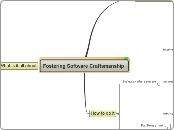Tree Diagramming
Alignment with Common Core Standards
CCSS.ELA-Literacy.L.7.1a: Explain the function of phrases and clauses in general and their function in speciic sentences
CCSS.ELA-Literacy.L.7.1c: Place phrases and clauses within a sentence, recognizing and correcting misplaced and dangling modifiers*
Typical Steps
1. Determine the parts of speech for each word in the sentence
2. Each word (part of speech) can be classified as either a NOUN PHRASE or a VERB PHRASE
3. The NOUN and VERB PHRASE + PARTS OF SPEECH make up the sentence
NOTE: Tree diagramming typically classifies each part of speech as either a noun phrase or a verb phrase
Articles for Future Reference
Searle, John R. Chomsky's Revolution in Linguistics. The New York Review of Books. Jume 29, 1972. Online
Duffy, Grace L. "Tree Diagrams." Quality Progress 45.4 (2012): 28-29. Academic Search complete. Web. 27 Oct. 2013
Chomsky, Noam. Aspects of the theory of syntax. 1965. Cambridge, Massachusetts: MIT press
Chomsky, Noam. Three models for the description of language. 1965. Retrieved from htt;://www.chomsky.info/articles/195609.pdf
Main Theorist
Noam Chomsky
He first proposed this theory in the 1970's
Pro's and Con's
Cons
-Can confuse children by relating so many different parts of speeches to one another
-Can be unhelpful if student doesn't understand one part of speech
-Can be intimidating to students because method is so complex
-Can confuse visual learners if abbreviations are used rather than using the actual word (Eg. VP instead of Verb Phrase)
PRO's
-Moves thinking from general to specific.
-Helps develope logical steps to obtain specific results.
-Helps students understand and remember the parts of speech more easily.
-Helps students identify parts of speech in relation to their placement in the sentence
What the letters mean
Phrasal Categories- A set o constituents that behave the same, or share the same functions and distritbution
S- Sentence
PP- Prepositional Phrase
(Preposition and a Noun Phrase.)
AdvP- Adverbial Phrase
(Can be used to modify verbs, adjectives, and adverbs.)
AdjP- Adjective Phrase
(Can be an ajective only, or an adjective plus an adverb, can movdify nouns.)
NP- Noun Phrease
(Can be a signle word, can be the subject, can be the direct or indriect object.)
VP- Verb Phrase
(Can be a verb, a verb and an adverb, can be a verb, a coun phrase, and a prepositional phrase.)
Two Basic Principles of Setence Order
Constituency Ordering
Every word in the sentence corresponds in a 1-to-1-or-more relationsihp with other words in the sentence.
If it is a consitituent, it can be replaced by a question using "who, what, where, how, why, or do/did what.
Very few lawyers tell the truth in court.
The lawyers---the truth
Very few lawyers saw what?
Who seldomly tells the truth in court?
Linear Order
The words in a sentence must occur in a particular sequence if the sentence is to convey the desired meaning.
Charley jumped off the roof.
The roof jumped off Charley.
Sentence Diagramming
Pictorial representation of the gramatical structure of a sentence.
The model is informative about the relations between words and the nature of syntactic structure and is thus used as a tool to help predict when sentences are and are not possible.








